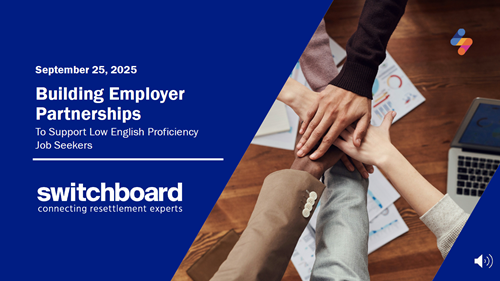Services for New Arrivals
The U.S. Department of Labor provides services to help new arrivals access meaningful training and employment opportunities. At the State level, workforce agencies are gearing up their staff to develop working groups with local workforce development agencies (LWDAs) that serve refugees, asylees, Special Immigrant Visa (SIV) holders, Afghan Humanitarian Parolees (AHPs), and other immigrants. At the local level, connecting with an American Job Center may be an important first step for new arrivals to find lasting empowerment and support.
What is the American Job Center?
The American Job Center (AJC) is a cornerstone of the public workforce system under the Workforce Innovation and Opportunity Act (WIOA). It is a critical, one-stop resource for job seekers, particularly those who might face barriers to employment. For refugees, asylees, parolees, SIV holders, and the resettlement agencies that serve them, the nearly 2,400 AJCs across the country stand ready to help empower these new arrivals by connecting them with employment and training services tailored to their needs.
AJCs bring together several partners in to one location to best serve potential customers. Comprehensive AJCs are physically located in each local area, as defined by the state, and many also have online or telephone services. Individuals who have recently resettled to a local area may benefit from an AJC’s services.
Resettlement agencies should work closely with local AJC administrators and staff to develop a pipeline from these agencies to career services available at the AJC. As recently resettled individuals seek services from resettlement agencies, it is a best practice for agencies to refer them to an AJC early on, so they can begin receiving services quickly. Resettlement agency leadership can connect with local workforce boards to discuss services and local employment opportunities, as to better prepare potential AJC customers for the discussions they may have once at the AJC. It may also be helpful for caseworkers to accompany resettled individuals to initial meetings at the AJCs, to help navigate any questions or concerns.
Some states have even co-located refugee and workforce services. The Utah Department of Workforce Services (DWS), for example, has a Refugee Center as a component of its broader workforce services site. This Center is a partnership between DWS, Salt Lake Community College, and Utah State University. It provides workforce services to refugees while simultaneously offering language and supportive services. Likewise, the Sacramento Employment and Training Agency’s Refugee Program serves as the administrator of the local AJC and provides WIOA employment services directly in a variety of languages. While not all local areas or states have done this, close collaboration is a good long-term goal for resettlement agencies and workforce systems.
Who does the American Job Center serve?
Individuals can enroll in the Adult or Youth programs at an AJC. Participants enrolled in the WIOA Adult program who are low income, receive public assistance, or are “basic skills deficient,” including English language learners, are entitled to priority individualized career services and training services. This may include many refugees, asylees, parolees, or SIV-holders. AJC staff must prioritize services to qualifying individuals ahead of other jobseekers. More information about WIOA Adult program eligibility can be found in Training and Employment Guidance Letter (TEGL) NO. 19-16.
When an individual seeks services at an American Jobs Center, they must provide proof of eligibility, which may differ by program. Career and training programs are available to citizens, legal permanent residents, refugees, asylees, parolees, and other immigrants authorized to work in the United States. All customers are required to provide proof of eligibility, identification, and date of birth. A program participant will NOT be required to provide a Social Security Number to receive services. There are multiple potential documents that can be used to fulfill reporting requirements (a full list can be found in TEGL 23-19). If an individual is unsure what documentation is appropriate, they can walk into any AJC and work with the individuals there to determine what documentation they need.
What services are available at the American Job Centers?
The AJCs are designed for meaningful access for all through a customer-centered approach. These services include basic career services, individualized career services (including training), and follow-up services. Individualized training may involve a participant working directly with a career counselor and receiving services based on individual needs.
For example, if a customer has limited English proficiency, interpretation services may be provided; all key information will be provided in the customer’s home language. The AJC may also choose to refer a customer to English language courses.
Key services available at an AJC may include, but are not limited to:
- Resource rooms with phones;
- Free internet and resume writing tools;
- Assistance with job searches or finding job training services, including on the job training (OJT) and apprenticeships;
- Career counseling;
- Career exchange services, such as connecting individuals with employers that may benefit from their skills;
- Skills testing;
- Getting information about prospective employers;
- Hiring events; and referrals to community resources and other agencies.
An individual may become enrolled in a free training program after working with a counselor at the AJC. If a refugee participant becomes enrolled in a WIOA Adult or Youth program, they may become eligible for supportive services as well via WIOA. Training programs may be short or longer term, depending on individual program requirements and the participant’s existing skills. Programs such as OJT and apprenticeship allow individuals to work for wages while receiving skills training for in-demand occupations in the local area. More information on these programs can be found in TEGL 19-16 and in the related resources below.
How can someone access the American Job Centers?
New arrivals and their resettlement agencies can find the nearest AJC through CareerOneStop, which also offers a host of online resources for jobseekers on career exploration, training opportunities including short-term training programs, high school equivalency, college programs, and job hunting tips on resumes and interviewing. CareerOneStop now lists ORR employment support programs including Refugee Support Services (RSS), Matching Grant (MG), and Refugee Career Pathways (RCP). CareerOneStop also provides links to workforce and labor market information that contain local information resources and tools.
Additional Resources on National, State, and Local Programs
U.S. Department of Labor, Employment and Training Administration:
- Find Your Local American Job Center: a collection of contact information of AJCs nationwide
- Overview of CareerOneStop.org for Workforce Professionals: a video on how to navigate CareerOneStop
- Apprenticeship Programs: the one-stop source to connect career seekers, employers, and education partners with apprenticeship resources
- Job Corps: a nation-wide residential career training program for young people ages 16 through 24
- Youth Employment Programs and Services: additional youth programs for young people ages 14 through 24










